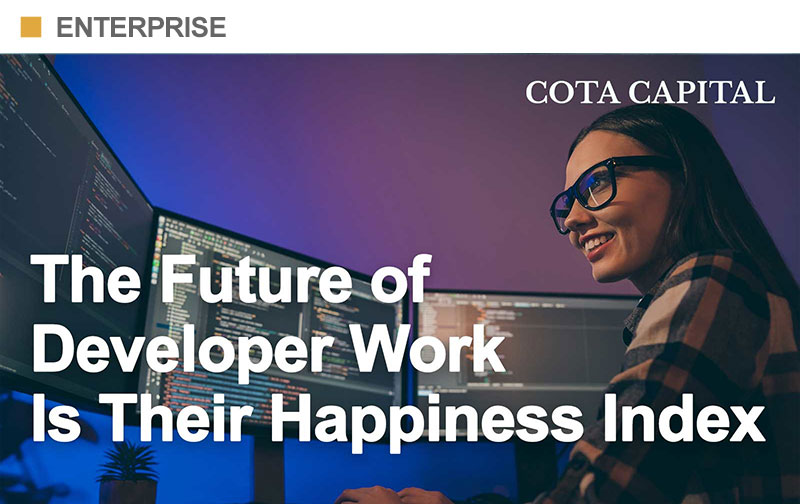
by Adit Singh, Partner
We’re very pleased to share the news that Cota Capital led Uplevel’s new $20 million Series A funding round. This follows the $7.5 million in seed venture funding the company raised in 2020 from Norwest Venture Partners, Madrona Venture Group and Voyager Capital.
What we like most about Uplevel is that it solves several key pain points that currently plague engineering organizations. The first problem is burnout among engineers. It’s no secret that the tech sector has the highest turnover rate of any industry. A LinkedIn survey found that tech companies have an overall employee churn rate of 13.2%. Turnover is even higher among software engineers, at 21.7%.
Software engineering managers and execs have a fundamental challenge. They’re trying to drive their teams to deliver as much product as possible but they’re trying to do so while at the same time preventing burnout.
Now, with the rise of remote work, tracking the wellbeing of developers has become even harder. Today’s work environment is increasingly impersonal. Many people don’t have the opportunity to form connections with coworkers by going out to lunch together or simply sharing the same physical space.
Employees are losing passion
One reason the so-called Great Resignation is happening is that people feel so disconnected from their work environment. Many form almost no bond with others. Engineers, in particular, log on and are instantly bombarded with Slack messages, often to the point where they are so distracted and frustrated that they can’t get any real work done. As a result, they lose passion for what they’re doing—and their companies lose people who otherwise would have been productive and valuable employees.
Engineering managers and executives struggle with this reality on a daily basis. They are under constant pressure to manage risk and deliver product, while also keeping retention and engagement high. Sure, they’re given some operational metrics around product delivery, but they get almost no metrics around employee burnout until it shows up as attrition, which is far too late.
This is where Uplevel comes in. Uplevel is an engineering insights platform that pulls metadata from the tools developers use to compute insights around operational factors like work velocity and throughput. Uniquely, Uplevel also pulls people insights, such as how often engineers need to context-switch between tasks or put out unexpected fires.
With Uplevel, for instance, engineering managers get “always on” alerts to understand team bandwidth and resources. They also get data-driven insights to better manage meetings, reduce disruptions and ensure that everyone can focus on deep, high-impact work.
Software development is still a black box
Another key pain point faced by engineering organizations is that they are forced to make many decisions on gut feeling alone without having access to the same depth of data as other functions, such as sales and marketing. For instance, when the VP of sales goes into the Monday morning meeting with the CEO, she can open Salesforce and instantly pull up the latest numbers and forecasts.
But the VP of engineering has no tool like that. If a product is running behind schedule, she has no real insight into why it’s slow and when it will be delivered. Every company has increasingly become a software company, yet software engineering is still a black box. It’s hard to monitor and manage progress. On gut feeling alone without visibility, making improvements to developer velocity is quite difficult.
Companies have been looking for ways to improve developer velocity for many years through custom in-house solutions or through transformation collaborations with professional services firms like McKinsey. But these have often proven to be costly efforts that fell far short of the mark.
Here again, Uplevel can help. Uplevel leverages both machine learning and organizational science to empower engineering effectiveness. It provides insights on key operational metrics ranging from cycle time and identification of bottlenecks to delivery, feature vs. bug work, code complexity, code reviews and other key factors of quality and good process, and even overall sprint prediction to help understand if the teams are likely to hit their goals based on historical data. Allocation, one of Uplevel’s most valuable insights, aligns engineering work to business priorities without the need for developers to fill out timecards and surveys. Uplevel does all this by analyzing daily data from messaging tools like Slack, collaboration tools like Jira, calendar tools like Office 365 and code repository tools like GitHub to provide teams with a holistic view and actionable insights to make engineering teams function more productively.
Uplevel makes better work possible
The beauty of Uplevel is that it helps engineering management assess the culture, health, and risk of their organization—without taking intrusive “performance management” steps like checking up on how much code this or that person wrote in a day. After all, developers are highly skilled professionals, not assembly-line workers.
Instead, Uplevel builds a behavioral model of each developer at their optimum. So, if behaviors change due to, say, a high level of distraction, managers can quickly intervene and take corrective action. Essentially, Uplevel makes it possible for developers to work the way they want to work so that they can achieve their full potential.
That’s good for workers and it’s good for employers. And it’s why leading companies like Avalara, Nutanix and Qualtrics have turned to Uplevel to bring focus time back to their developers, and predictability and well-being back to the engineering experience.
This is why we’re excited to be new investors in Uplevel and why we look forward to its great achievements ahead.
